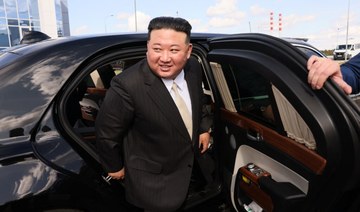KABUL: For generations, the pelts of newborn karakul lambs were one of Afghanistan’s major export items, sought after at home and abroad to produce the iconic caps worn by rulers, statesmen and trend-setters — prized fashion items that sold for up to $3,000 each.
However, in recent years, there has been a drastic decline in demand for the eye-catching headwear due to the special breed of sheep that produces the pelt becoming endangered.
“In the past 10 years, the industry has gone bankrupt. There is no market for it now,” Mohammad Salim Saee, head of the agriculture department of northern Balkh, one of the key production areas of karakul sheep, told Arab News.
At its peak in the 1970s, the volume of karakul sheepskin exports to the West stood at 10 million pieces, he said, adding: “You cannot compare it in terms of the percentage now with what we used to produce and export.”
It is now difficult to find a single shop selling karakul sheepskins among the dozens of stores lining the famous avenue of Shahe-Do-Shamshera in the Afghan capital Kabul, where former president Hamid Karzai used to source his trademark hats.
The karakul cap became so synonymous with Karzai that US designer Tom Ford once named him “the chicest man on the planet” for his sartorial choice.
Besides Karzai, regional leaders such as Mohammed Ali Jinnah, the founder of Pakistan, and other rulers in Central Asia and across Russia have been seen donning the popular fashion accessory.
Mohammad Aref, head of the agency for karakul production in Balkh, said that Afghanistan exported almost 500,000 skins to the West and across the region just four years ago.
However, there has been a gradual decline in volume since then, with just 17,000 pieces exported to Uzbekistan last year.
Mirwais Ibrahimi, a karakul trader in Balkh, said: “Until a few years ago, 280 shops were selling karakul skins, but now only three or four are left.”
He traces the decline to growing opposition, both at home and abroad, to the “barbaric” practice of ripping the skin off newborn lambs to source the fur.
“In Afghanistan and abroad, the killing of the newborn lamb is regarded as a cruel act. That is why there isn’t much desire for it as there was some years ago,” he told Arab News.
Soon after the birth of a lamb, dealers peel the pelt from its skin before it is fed by the ewe, “because it affects the quality of the skin.”
Rahmat Shah, a dealer in Jowjzan, another key karakul region, said: “Some butchers in the past would even cut through the abdomen of a pregnant sheep to take its baby, but the practice was stopped as it was considered too cruel.”
Kazim Hamayoun, a senior official in Afghanistan’s National Environmental Protection Agency, said that no regulation or law bans the practice, “which is a concern.”
He added: “Indeed, it is a major concern. The younger a karakul, the higher its value, and the quality of the fur will be finer, too. It is a serious threat to wildlife.
“We do not have anything preventing this — no law or directive. We have distributed leaflets informing dealers about it, but have not done a poll to determine its impact. We hope to launch a national dialogue on this.”
However, Shah lamented the loss of business and the end of an Afghan tradition.
“There is no business at all. We do not know how we and the government can save this industry and tradition from being buried in history forever.”




























